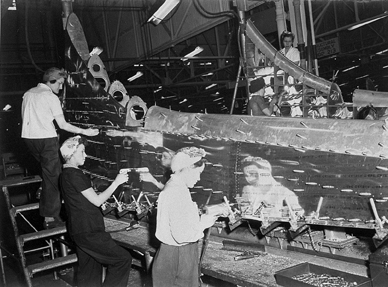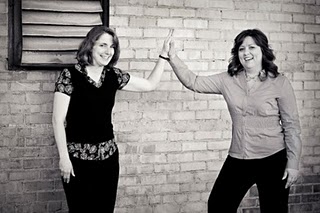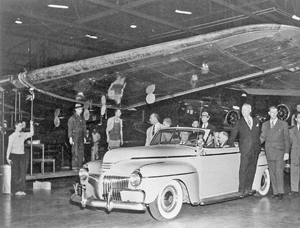 Synopsis:
Synopsis:
The year is 1943 and America is at war. Rosalie Madison was engaged to her childhood sweetheart, Vic, but did not marry him before he was called into battle. Now she feels extremely guilty about having hesitated, especially since the chance to marry him has been forever lost to her. She is determined to assuage her guilt and honor Vic’s memory by working at the Boeing Plant 2 in Seattle as a riveter.
En route to work at the plant, Rosalie stops at Victory Square and literally runs into an ambitious local newspaper reporter who has been dispatched to get candid photos of movie star Lana Turner as she takes the stage during a personal appearance there. Rosalie has a very low opinion of journalists — that was her estranged father’s profession. Her father’s habit of abandoning his family to chase after the next big story, leaving broken hearts and promises in his wake, has left Rosalie determined never to trust a reporter.

Meanwhile, Rosalie and some of her fellow riveters face homelessness. The apartment building in which they live is about to be torn down and they have 30 days to find a new home. Miss Tilly, proprietor of The Golden Nugget coffee shop, owns a dilapidated old house in Victory Heights. If Rosalie and her fellow riveters can build B-17 Flying Fortress bombers, Miss Tilly figures they should be able to tackle dry rot, peeling paint, broken windows, and the house’s other problems in order to save it from condemnation. If the women can fix the house up, she will let them make it their new home. But money is tight and supplies are being rationed. Can they save the old house where Kenny spent so much time as a young man, including during his college years when he stayed there with the woman he calls Aunt Tilly?
Can Rosalie learn to trust Kenny, despite his profession, and give in to her feelings for him? Can Kenny understand what it means to engage in work that will make both one’s family and oneself proud and fulfilled?
Review:

In Seattle, the Boeing Plant 2 was large enough for eight football fields to fit inside it. The plant was camouflaged by a residential neighborhood constructed on its roof, designed to fool any Japanese bombers who might navigate into the airspace over Seattle. During the War, as many as sixteen B-17 Flying Fortress bombers were produced there daily — around 7,000 total — largely due to the efforts of the “Rosie the Riveters” who worked on the assembly line for $.65 per hour.
The old plant was demolished in 2010, given that no planes had been manufactured there for over 40 years. But history will never forget Boeing Plant 2 or the “Rosie the Riveters” who toiled there with the hope that their contribution would help bring America’s soldiers home safely.
Authors Tricia Goyer and Ocieanna Fleiss memorialized that time, place, and some of the actual events that transpired there in a charming work of Christian historical fiction. Against the backdrop of actual events, Goyer and Fleiss have created a cast of fictional characters that are convincingly authentic. Painstakingly researched and accurate to the last detail, Love Finds You in Victory Heights, Washington draws the reader back through the decades to a time when Americans were united in a common goal and everyone was called upon to do his/her part to bring about victory.


Kenny, meanwhile, is dealing with his own share of guilt. His father, a chaplain, has been injured while serving and his family knows only that he survived, but is not yet aware of the magnitude of his injuries. Kenny promised this father that, rather than enlisting, he would get a job in a big city where he would have an opportunity to write important newspaper stories that “make a difference.” Instead, he has been reduced by his editor, Mr. Bixby, to writing fluff pieces. He is driven by his desire to write a story that will expose the need for contractors to be accorded the same benefits and assistant as veterans, but it looks like the story might be assigned to his arch rival at the newspaper unless he can convince Rosalie to be the subject of articles focused upon “Seattle’s Own Rosie the Riveter.”
Goyer and Fleiss expertly examine the emotional struggles their characters are facing by revealing their inner dialogue, as well as their silent prayers. The story is told from a distinctly Christian viewpoint — not only is Kenny revealed at the outset to be a man with a deep and abiding faith, Miss Tilly is responsible for leading Rosalie back to her faith through a conversation in which Rosalie feels safe enough to reveal her tumultuous feelings to the kindly older woman. The narrative is also replete with references to the main characters’ desire to see their friends and coworkers become believers. Changes that come about in Kenny and Rosalie’s lives are attributed to God having led them in a particular direction and toward a specific result. Thus, lacking in this story is some of the introspection and self-focused analysis of the main characters’ motivations and the rationale underlying their decisions that epitomizes secular fiction. Rather, the characters in Love Finds You in Victory Heights, Washington tend to react to situations and events, agonize about their conduct, and then find resolution through adherence to their faith, just as they find forgiveness from each other in the same manner.
The story is mesmerizing because the characters are intriguing and relatable, whether or not the reader shares their religious outlook. Kenny and Rosalie are earnest, well-intentioned people confronting obstacles and challenges that are peculiar to the extraordinary time in which they live.
Goyer and Fleiss have exquisitely captured the culture and mood of the period by injecting details pertaining to actual events, such as Rosalie’s first meeting with Kenny in Victory Square: Lana Turner did, in fact, appear there in support of the war effort. The characters discuss the fact that President Roosevelt toured the plant and Rosalie proudly tells Kenny that, although she did not actually see the President, she worked on the plane that the President viewed. And there is a very poignant moment when Rosalie looks at the poster of Rosie the Riveter and ponders her own status as Seattle’s local version of that icon. Goyer and Fleiss also set the tone by describing the characters’ jaunts to a couple of the actual nightclubs that were popular in those days and the way they dance to some of the most recognizable music of that era.
Love Finds You in Victory Heights, Washington is a delightful look at the young lives of fictional representatives of what Tom Brokaw termed “the greatest generation.” It is not only an entertaining tale of how two people overcome past hurts and regrets and, through grace, forge a life together, it is also an informative glimpse into how the residents of one region of this country contributed their time and talent in support of U.S. troops who were fighting on various battlefields around the world. I highly recommend it to anyone who enjoys reading historical fiction written from a Christian perspective.



5 Comments
Great subject, great review, can’t wait to start reading this book. I’ve always been fascinated by this period and the strength of both man and women of those times.
Awesome review. From a writer’s point of view, doing research to make historical events or people authentic is really painful. That, in itself, makes me want to read the book.
I can’t wait to go to the book store and pick this book up. It sounds like a real epic book and I love your review of it.
I’m so anxious to get this book. I love Tricia Goyer!
If you’re a fan of Love Finds You in Victory Heights, Washington and authors Tricia Goyer and Ocieanna Fleiss, don’t miss their new GET RIVETED contest. The winner receives a Rosie the Riveter prize package guaranteed to be a major day brightener! Here’s the link to enter: http://www.triciagoyer.com/contest